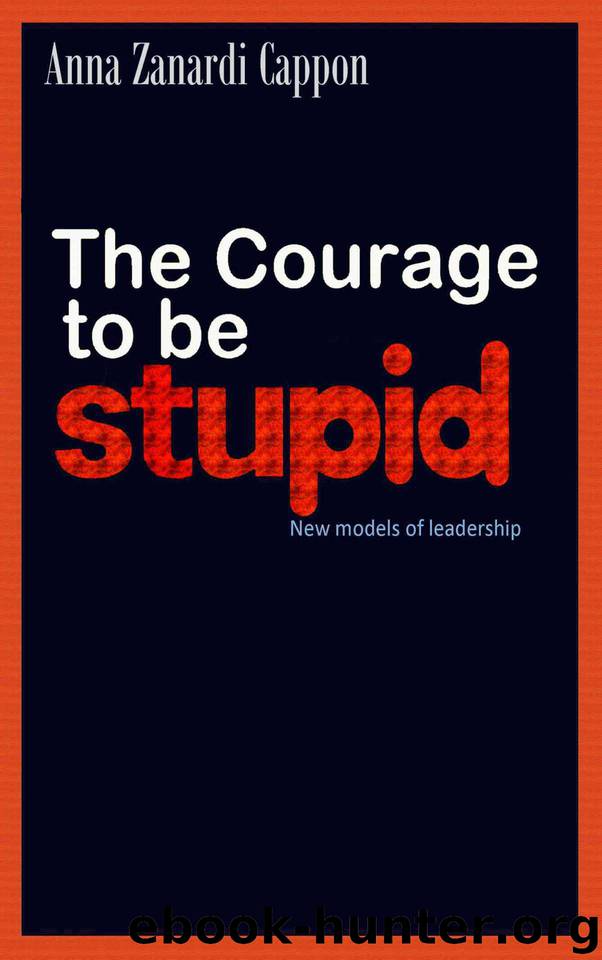The Courage to be Stupid by Capon Anna Zanardi

Author:Capon, Anna Zanardi [Capon, Anna Zanardi]
Language: eng
Format: epub
Publisher: Unknown
Published: 2012-10-09T16:00:00+00:00
Courage and participation
The “being person” expresses courage through his actions and behaviour. It is self-centralised, individual and self-determined. Courage enables the individual to participate in the world, to be part of a universe of beings. Courage includes sharing, taking part in something or being part of something. The person asserts himself through his participation with others, in the progress of a cause, through the empathy of a group. The courage to be ourselves and the courage to belong to something are traits of interdependence. Such interdependence implies a collective demonstration of courage. Through participation, a person becomes capable of asserting himself as an individual and as a member of a larger society. Courage as an individual quality leads to shared courage and courage can originate from one or the other, indicating the need to be even more courageous as a personal demonstration aimed at sharing.
These various aspects of courage are important in helping us to understand how the concept of courage is applied to the formation of leaders. Courageous actions are a method for creating and attributing meaning to one's actions in life. A conscious effort must be made to study courage in order to understand how to develop such dimensions in people.
In 1975 Mei elaborated and extended the work of Tillich expressing the opinion that courage emerges in the place of desperation, not because of desperation. Courage is not only a virtue but the greatest of all virtues. Mei states that a key characteristic of courage is the requirement to be centred on one's being. Without this centering there is a feeling of emptiness. Emptiness corresponds to apathy and apathy leads to cowardice. This is the reason why we must always be in touch with the centre of our being, otherwise our efforts will not be genuine (De Ruiter, 2000).
Being courageous then, means moving towards one's self-realisation, intended as the transformation of one's consciousness. A person who chooses not to act according to his own being or convictions risks self-destruction: not only will he experience cowardice, but also stupidity.
The courage required to reach a stage of growth in which one can fully demonstrate one's potentiality is a vital quality on the route to the knowledge of ourselves and the world. It is a particular commitment to ourselves and a greater morality. Mei separates courage into four typologies: physical, moral, social and creative. For each one a definition is provided.
Download
This site does not store any files on its server. We only index and link to content provided by other sites. Please contact the content providers to delete copyright contents if any and email us, we'll remove relevant links or contents immediately.
Hit Refresh by Satya Nadella(9115)
The Compound Effect by Darren Hardy(8917)
Change Your Questions, Change Your Life by Marilee Adams(7725)
Nudge - Improving Decisions about Health, Wealth, and Happiness by Thaler Sunstein(7684)
The Black Swan by Nassim Nicholas Taleb(7095)
Deep Work by Cal Newport(7053)
Rich Dad Poor Dad by Robert T. Kiyosaki(6586)
Daring Greatly by Brene Brown(6494)
Principles: Life and Work by Ray Dalio(6394)
Playing to Win_ How Strategy Really Works by A.G. Lafley & Roger L. Martin(6198)
Man-made Catastrophes and Risk Information Concealment by Dmitry Chernov & Didier Sornette(5993)
Digital Minimalism by Cal Newport;(5743)
Big Magic: Creative Living Beyond Fear by Elizabeth Gilbert(5733)
The Myth of the Strong Leader by Archie Brown(5487)
The Slight Edge by Jeff Olson(5402)
Discipline Equals Freedom by Jocko Willink(5367)
The Motivation Myth by Jeff Haden(5196)
The Laws of Human Nature by Robert Greene(5146)
Stone's Rules by Roger Stone(5070)
